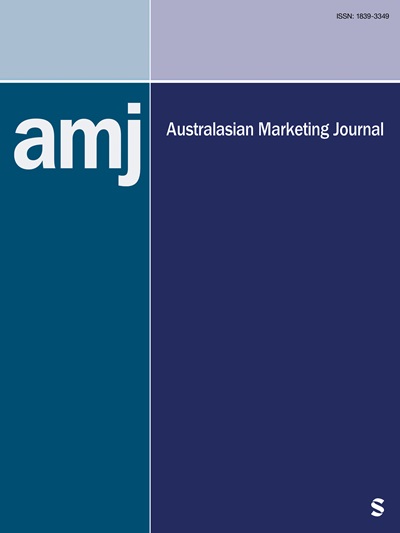当我第一个,我可以使用更多:联合呼吁对购买可持续产品可能性的不同影响
IF 4
Q2 BUSINESS
引用次数: 3
摘要
虽然可持续产品的推广大多带有内在的吸引力(例如,“购买这种产品,为环境做一些有益的事情”),但营销人员也可以结合外在的吸引力(如,“购买该产品,向他人展示你的可持续性”),从而产生共同的吸引力。然而,在推动消费者对可持续产品的有利评价方面,这种联合呼吁是否比内在呼吁更有效,目前尚不清楚。本研究调查了联合诉求与内在诉求对消费者购买可持续产品的可能性的不同影响,并测试了先锋地位在这方面的调节作用。在两项实验研究中,这项研究表明,联合(与内在)吸引力将导致从被视为先锋的品牌购买可持续产品的可能性更高,但从被认为是追随者的品牌购买持续产品的可能性更低。此外,联合呼吁的这些积极和消极影响是由两种不同的机制驱动的——分别是情感价值和消费者怀疑。讨论了本研究的理论和实践贡献。本文章由计算机程序翻译,如有差异,请以英文原文为准。
When I’m First, I Can Use More: The Divergent Effects of Joint Appeals on Likelihood of Purchasing Sustainable Products
While sustainable products are mostly promoted with intrinsic appeals (e.g., “Buy this product and do something good for the environment”), marketers can also incorporate extrinsic appeals (e.g., “Buy this product and show others how sustainable you are”), thus creating joint appeals. However, it remains unclear whether such joint appeals will be more or less effective than intrinsic appeals in driving favorable consumer evaluations of sustainable products. This research investigates the divergent effects of joint versus intrinsic appeals on consumers’ likelihood of purchasing sustainable products and tests the moderating role of pioneering status in this regard. Across two experimental studies, this research demonstrates that joint (vs. intrinsic) appeals will lead to a higher likelihood of purchasing sustainable products from a brand perceived as a pioneer, but to a lower likelihood of purchasing sustainable products from a brand perceived as a follower. Further, these positive versus negative effects of joint appeals are driven by two distinct mechanisms—emotional value and consumer skepticism, respectively. The theoretical and practical contributions of this research are discussed.
求助全文
通过发布文献求助,成功后即可免费获取论文全文。
去求助
来源期刊

Australasian Marketing Journal
BUSINESS-
CiteScore
14.90
自引率
16.70%
发文量
25
期刊介绍:
The Australasian Marketing Journal (AMJ) is the official journal of the Australian and New Zealand Marketing Academy (ANZMAC). It is an academic journal for the dissemination of leading studies in marketing, for researchers, students, educators, scholars, and practitioners. The objective of the AMJ is to publish articles that enrich and contribute to the advancement of the discipline and the practice of marketing. Therefore, manuscripts accepted for publication will be theoretically sound, offer significant research findings and insights, and suggest meaningful implications and recommendations. Articles reporting original empirical research should include defensible methodology and findings consistent with rigorous academic standards.
 求助内容:
求助内容: 应助结果提醒方式:
应助结果提醒方式:


